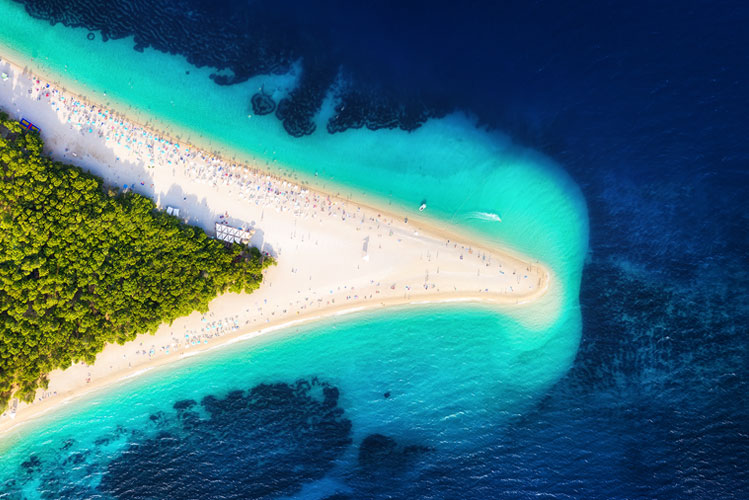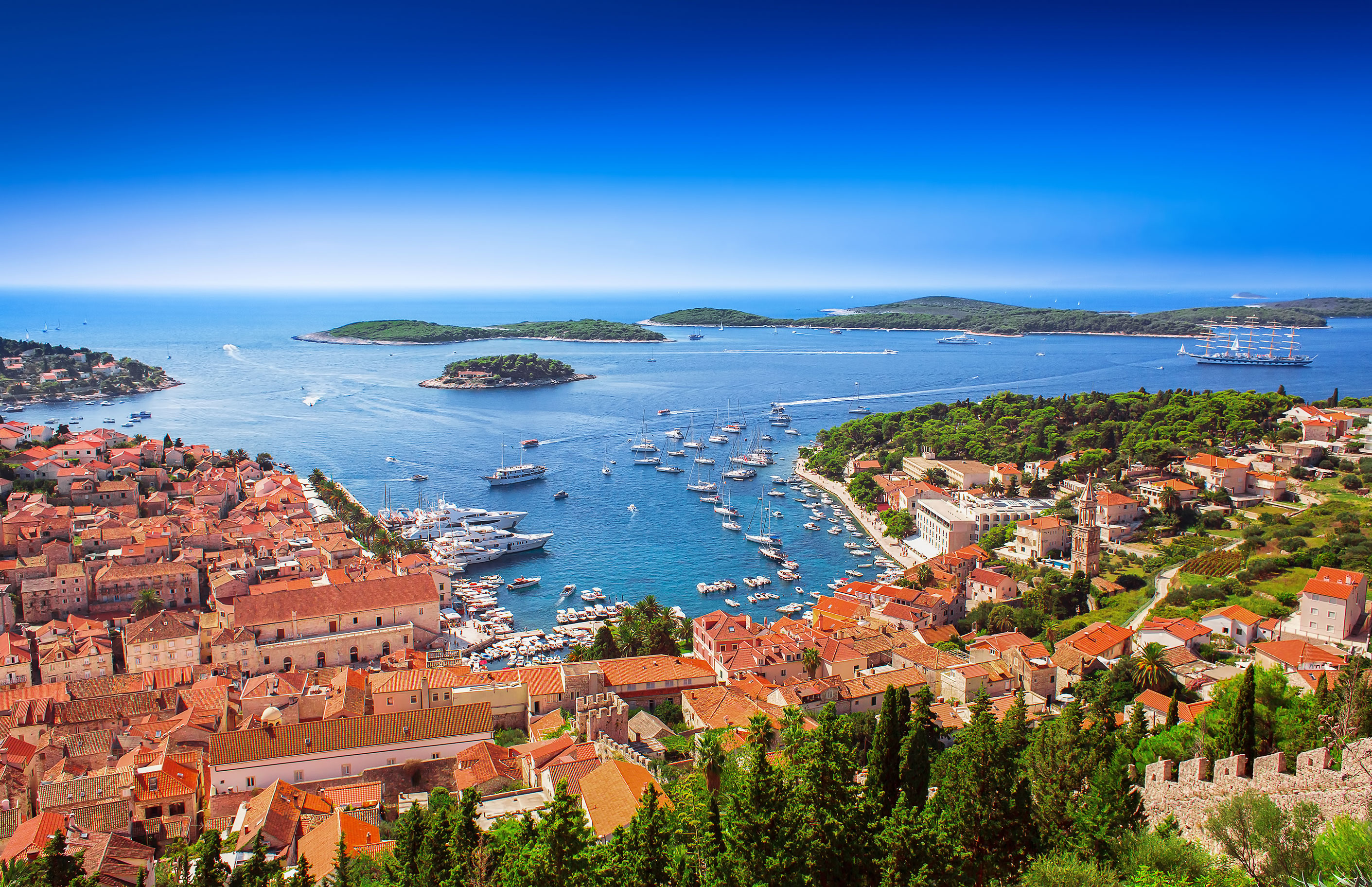Island Korčula – Travel guide
by Welcome Center Croatia | Last updated Feb 21, 2022 | Published on Feb 21, 2022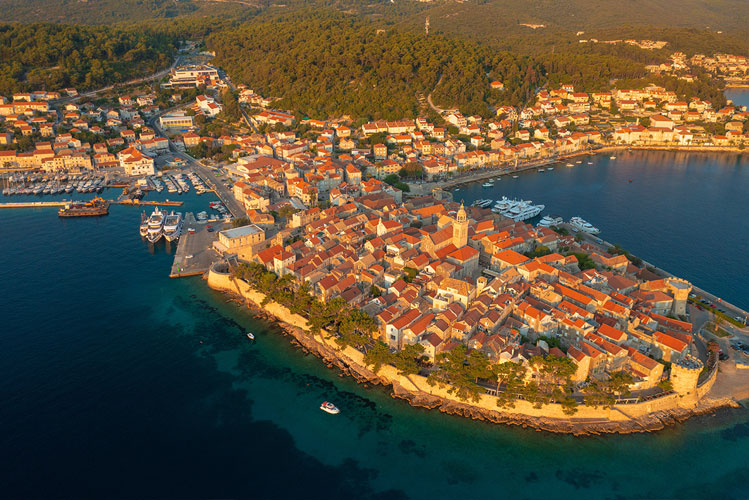
Croatia is known for its host of islands. Korcula is the sixth-largest island in Croatia. The island is 20 miles long and about four to five miles wide on average. Korcula is known for its dense forest, for which ancient Greeks referred to it as Black Korcula (Kerkyra Melaina)
About Korcula Island
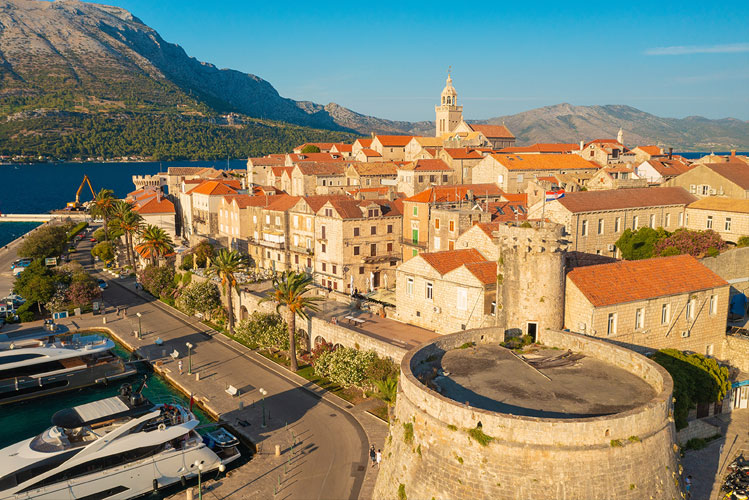
Below are some essential basics you should know about the island’s history, nature, and culture.
The History of Korcula Island
Korcula island has been under the rule of several different powers over the years. It has been ruled by the Illyrians, Greeks, Venetians, Austrians, and Brits. Each rule has left a significant mark on the island and positively shaped it. For instance, the Greeks are responsible for its popularity as a delicious wines producer. They brought grapes into the island and introduced its dwellers to wine production. On the other hand, the Venetians brought in skilled artisans who carved architectural triumphs in the island’s Old Town.
Korcula’s culture
The population of Korcula has lived at one with the land and the sea throughout the island’s existence. Historically, the people of Korcula were known as ship-builders and highly skilled at shaping and bending wood into safe and unsinkable vessels. Today, wine and grape cultivation are popular activities among the island’s dwellers. They also take part in sea fishing and love steering boats. However, ship-building is still a significant part of the island’s culture.
The island is also known for its good food and wine. The people of Korcula center their lives around family and live a relaxed life with music and dance at the core.
Sword dancing and acapella singing of the Klapa groups are significant parts of the island’s culture and shaped its current practices.
Nature
Korcula is also known for its extreme fertility. The island is covered with evergreen conifers and pines, Mediterranean plants, and herbs. Olives, grapes, citrus fruits, pomegranates, figs, and carobs also grow on the island. The vegetation on the island creates a heavenly scent in the air. They also create a beautiful array of colors on the island throughout the year. Towards the end of the lush green fields, the stunning blue sea takes over. The island hosts some of the most beautiful beaches and bays dotting the coastline. Most of the beaches are pebble and rocky. However, there are a few sandy beaches like Lumbarda. The water around Korcula island is some of the clearest you will ever witness or swim in.
Underneath and above the sea, the island hosts a wide range of animal life. Examples of underwater animal life are; fish, crabs, octopuses, urchins, and octopuses. On the surface of the water, there are dolphins and turtles. Besides the sea animal life, there is also wildlife on Korcula’s land. This includes mongoose, snakes, a host of bird species, pheasants, and tortoise.
About Korcula town
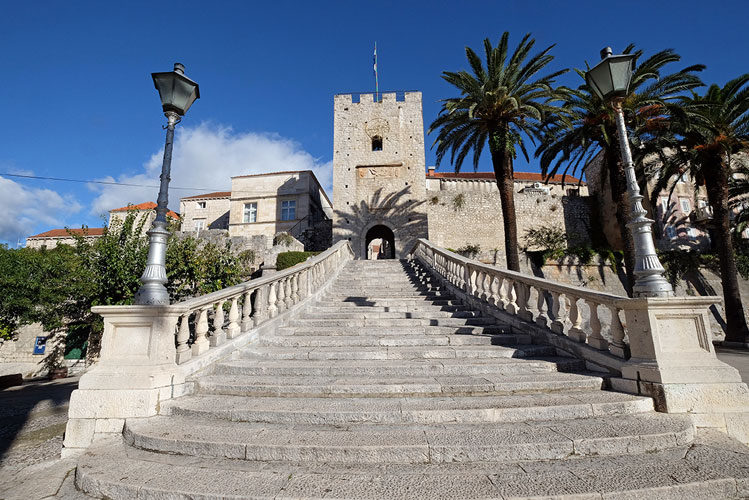
Korcula town is located on the well-protected eastern coast of Korcula island. It is an incredible and safe place for mooring and anchorage.
There are two principal harbors on Korcula; the western and eastern harbor. While they provide good shelter for sailers of the central Adriatic, the eastern harbor in Korcula town is better. After mooring or anchoring near Korcula town, you can take a short walk to the town or visit one of the bars and restaurants on the Uvala Luka shore.
Below are some other things you should know about the town;
Korcula town is known as Little Dubrovnik
Other than its excellent harbor also features Venetian origins. For this reason, the beautiful Korcula town is also known as Little Dubrovnik. Dubrovnik is one of the most beautiful places in the world. Its resemblance to Dubrovnik goes beyond its beauty. It is also related to its being a fortified town surrounded by old walls. Its interesting street arrangements, palaces, medieval churches, and squares resemble Dubrovnik.
It hosts Marco Polo’s birth house
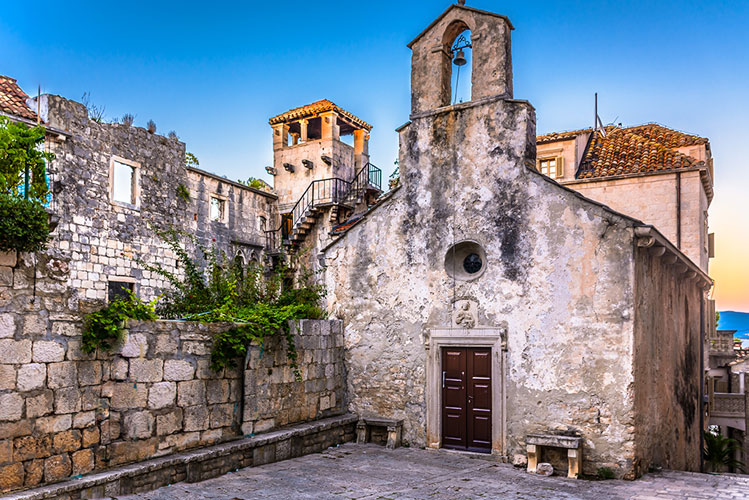
Among the many incredible buildings in Croatia, Marco Polo’s birth house is the most famous. Marco Polo is one of the most popular world travelers, explorers, and writers.
It is home to some incredible historical architecture
Korcula town also features some of the most outstanding historical constructions like the Gothic and Renaissance St Mark Cathedral, the Gabrielis 16th century Renaissance-style palace, the town hall, and the 14th century Franciscan monastery on Badija.
Take Note: Badija is a small islet in the Korcula archipelago near Korcula town. The beaches on Badija are great for stop-overs when sailing in Croatia.
It is also worth mentioning that Korcula sprung up on a small peninsula formerly connected to the mainland with stone stairways. Today, it is among the city’s most significant symbols.
Traditional Moreska sword dancing
One of the proudest traditions in Korcula is the Moreska sword dance. It is also one of the most unusual Adriatic customs on the island. The fighting dance was once popular in Southern Europe. However, it began in Span as a protest against the Moorish occupations. It was introduced in Korcula island in the 15th century. The sword dance was performed in many Mediterranean towns throughout the 19th century. It is currently commonly performed in Korcula. Traditionally, it was only performed on St Theodore’s day (July 29th). St Theodore is Korcula’s patron saint. However, it is presently performed regularly.
The dance is essentially a sword battle that tells the story of an abducted princess. The story starts with a speech by the princes and her declaration of love for the White King. The White King is usually dressed in red. Sadly for the princes, the Black King is also in love with her and steals her from the love of her life. The fighting dance primarily features the Back King and White King’s armies fighting with swords for the princess. The battle aims to restore the princess to her true love.
Museums in Korcula
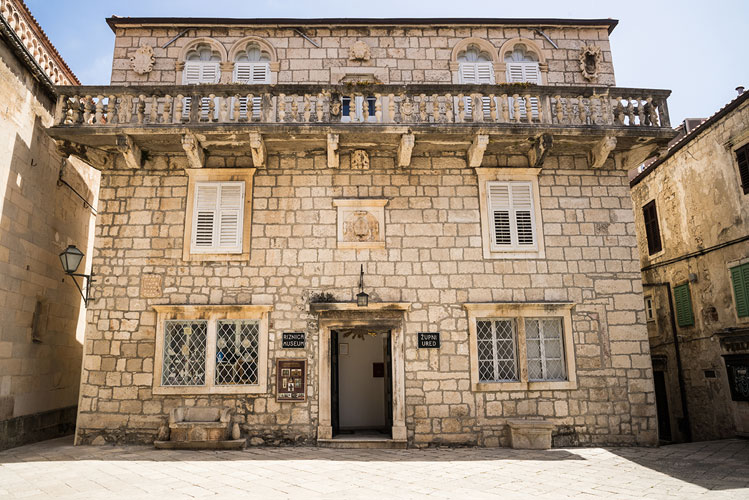
The island is home to museums with exhibitions of objects relevant to the island’s history. Some of these museums are;
The Korcula Town Museum
The Korcula Town Museum was opened in 1957 and is based in the old town center. It is found on the primary town square in the Rennaissance palace, Gabrielis. It is the most significant and famous museum on the island. It houses 24 collections, including archeological, traditional ship-building, ethnographical, stone-masonry, musical, natural, and maritime collections. A walk through the museum will take you through several thousands of years worth of history. Therefore, most visitors get all the history they need in one place.
You can find informations about opening hours and entrance fee on the official website.
The Saint Mark abbey treasury in Korcula town
The abbey treasury is located at the center of the Karcula Old town, found on St Mark’s square, in Bishop’s place. It was established and opened to the public in 1954.
It features a host of collections. Such collections include icons, lapidarium, monuments, fragments of archeological interests, the ancient coats of arms, liturgical vestments, and contemporary Croatian art.
It also features a library, archives, and a parish office, on the ground floor. The ground floor of the abbey treasury also features an exhibition in the form of an ancient kitchen. It represents the traditional lifestyle well-kept-up in a kitchen. The kitchen is applied because it is a central place of old households.
The Vela Luka Cultural Center’s Museum Collections
The Cultural Center is based in an attractive architectural structure near the St Joseph Church in Vela Luka. It hosts the museum and a host of museum collections. It features archeological collections, modern and contemporary art, traditional wooden ships, mosaic, and drystone wall architecture collections, to name a few. The museum opened to the public in 1965.
The Marco Polo Museum in Korcula town
Marco Polo is a significant personality in Korcula. In addition to hosting Marco’s birth home, Korcula town also houses the Marco Polo Museum. It is located outside the longstanding city fortifications. The museum was opened in 2012 and it comprises of 7 parts with high-quality scenography and hyper-realistic. The museum was opened to represent and capture some of the unique moments in Marco Polo’s life.
The House of Marco Polo in Korcula town
As mentioned previously, Korcula town houses Marco Polo’s birth house. De Polo family originally owned the house. It is among the primary reasons it is believed to be the house where Marco Polo was born. Other than that, there are no additional definite proofs of this. The people of Korcula believe that the famous explorer was birthed here in 1254. The house currently features exhibits reminiscent of the world’s most renowned explorer and a host of objects from the 1250s. Today, the house is the property of Korcula town. It was opened to the public in 2015. Before this, it went through seven years of exhaustive survey and refurbishment. The top of the house features a tower from which you can witness some of the most beautiful views of the town and its surrounding host of islets (archipelago). There are plans to open an extensive museum devoted to Marco and his explorations.
The Museums of Icons in town Korcula
This museum is located near the 14th All Saints church on the Peninsula Old Town of Korcula. It houses a collection of the Brotherhood of all Saints’ icons. The collection includes icons painted on wooden and golden plates obtained by Korcula mariners and traders on their travels through the eastern Mediterranean sea. It also contains statues, habits, flags, ecclesiastical candelabra, shrines, and essential documents of the Brotherhood of Saints. Its icons have been open for public display since 1962.
Note: The Brotherhood of Saints is the among the first fraternities in Korcula island.
The Ethnographic collection Barilo in Blato
The Ethnographic Collection Barilo is based in a longstanding residential building owned by the Marinovic house in the center of Blato. It is a unique destination in Korcula island to taste and experience its beautiful traditional life. It aims to keep the island’s traditions alive. The collection features 600 exhibits organized in various exhibition spaces. They include a fireplace, kitchen, living room, bedroom, and areas with extensive folk costumes, clothing, and handicrafts. There are also collections of agricultural tools, fishing gear, and stone items for everyday applications.
This destination also features a gorgeous garden where visitors can experience the aroma of medicinal and ornamental plants. You can walk through the island’s centuries of traditions by walking through the museum. This is a great family activity. Further proof of the collection’s significance to Korcula’s culture is that it is under the patronage of the Croatian Ministry of Culture.
The Memorial Collection of Maksimilijan Vanka
The Memorial collection features some of the most important works of Maxo Vank, a Croatian-American artist. He was born in Zagreb in 1889 and lived in America for a while. The artist is known for his Millvale Murals located in the first Catholic Parish church in the Republic of Croatia, near Pittsburgh in Pennsylvania’s Millvale. He created the Murals as a compliment to all Croatian settlers who labored in Pittsburgh’s mills and mines. Following his death in 1963, 47 of his paintings, his house, and studio to Korcula town, which was significant to the painter. He visited Korcula town regularly to host painting colonies. The dedicatory collection can be found on the Western borders of the town. It was renovated in 1998 before being opened to the public.
It is worth mentioning that the Old Town of Korcula is also referred to as a museum of its own.
Top 6 beaches in Korcula Island
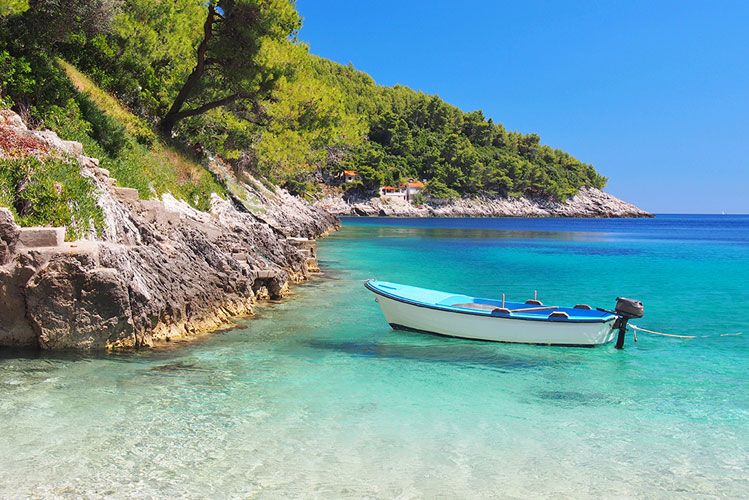
As mentioned before, Korcula island features various sandy, pebbled, and rocky beaches. Below are six of the most visited beaches in Korcula Island;
1. Bacva Bay near Pupnat
This is a small pebble bay and one of the most beautiful beaches in Korcula. It features clear azure waters and is an excellent place for lounging and enjoying relaxing moments. It is located 13 km from Korgyla towards Pupnat. Its remote location forces you to drive there. You can reach the island by driving towards Pupnat, taking the road on the left before the village. There are clear signposts to the bay. There is also a small restaurant at the bay to enjoy great meats, fresh fish, and seafood. It also features a large rental house for individual and group visitors.
2. Bilin al & Prvi Zal, Lumbarda
These are the most popular sandy beaches in Lumbarda. Lubarda is based 6km from Korcula. They are great destinations for taking children since there are no rock or urchin injury risks. The beaches feature shallow waters that are also safe for children. There is also a host of activities for adults here. There is a café bar or restaurant at each beach. You can travel between Korcula and Lumbarda by taking regular buses or water taxis.
3. Vaja, Recisce
This is by far the most visited beach on Korcula island. It is a pebble beach about 20 minutes from Recasce. The beach features clear water, great for snorkeling. It also features a small shack bar for refreshments. You can reach the beach by driving down the main road up a steep hill out of the village. Once you reach the end of the tarmac road, follow the right path to the beach. Take note that the course is steep. Once you arrive at the beach, you can rent sun umbrellas and have a great time with your family.
4. Prizba near Blato
This is a coastal resort based on the west of Korcula island, ten km from Blato. It features clean blue and warm waters and a pebble beck for lounging and rocky bathing. It is privately connected to holiday rental apartments along the coastline. There is also a supermarket and a few restaurants.
5. Pupnatska Luka near Pupnat
This is a gorgeous deep pebble beach a few kilometers from the Pupnat village. Its deep bay keeps it sheltered and makes it family-friendly. You can reach the beach by personal transportation or private return transfer. If you choose to drive a car or scooter to the beach, you must pay for parking. There are restaurants serving grilled meats, seafood, salads, and snacks at the beach. There is also a bar where you can enjoy a cold drink.
6. Zitna near Zavalatica
This is a small pebble beach located next to Zavalatica bay. It is a great destination to spend a relaxing day while vacationing on Korcula island. It features warm azure waters for swimming and snorkeling. The color of the seas blends incredibly with the blues and greens in the surrounding. Although it is a pebble beach, the sea bed is primarily sandy, creating a unique watercolor.
You can get to the beach by passing through Cara and driving to Zavalatica through the road above the bay. You cannot drive to the beach. Therefore, you must leave your car at least five minutes away. Note that there are no amenities at the beach. Consequently, it would be wise to shop in Zavalatica before heading to the beach. However, there is a holiday house next to the beach.

